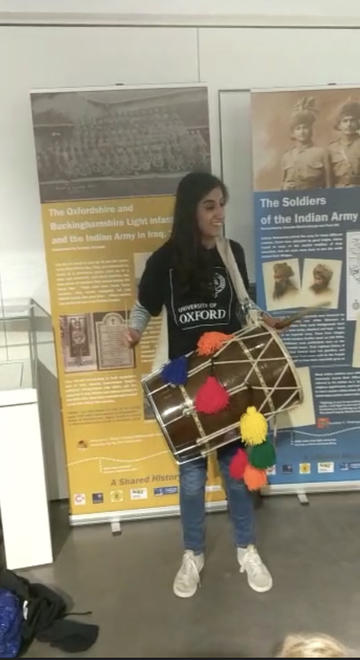Reflections on Community History

In recent days, I realised that it was time to let go of my incredibly comfy – but thoroughly worn-out – walking trainers. They were originally a panic buy from mid-March 2020, after it suddenly hit me that our regular social lives were about to be turned completely upside down, and all that I’d be able to do in the way of outdoor leisure was go for a walk.
I was lucky that those hastily-bought trainers were a good fit from Day 1, because I racked up a hefty mileage pounding the pavements of my neighbourhood’s streets, or doing laps of my local park in High Wycombe. It can be tough and monotonous to walk the same path everyday, but as many of us found during that challenging period, it was a much-needed chance to get some fresh air and break up the long hours spent at home in lockdown.
In a more uplifting fashion however, I know that I and many others also found it to be a unique opportunity to be thrown into much closer contact with our local communities than we had been able to experience for a long time.
On those regular walks, my eyes and mind often sought out novelty wherever they could find it. Now that I wasn’t rushing past places in order to be on time to meet a friend, or catch a bus or train for work; I actually noticed engravings, plaques or architectural features on buildings of all ages that I’d walked past hundreds of times, but never properly looked at before. I had chats with neighbours who I hadn’t previously encountered as a busy commuter who spent little time at home, and it brightened up my walks when I then had new faces to exchange warm smiles and waves with as I passed by.
Through all this, a fresh appreciation for the people and places – and most movingly, the stories – connected to my local area, was deepening within me. I was already aware of the power and richness of community history, having led a collaborative project in 2017-18 to explore the history of the Indian Army’s WW1 links with Oxfordshire and Buckinghamshire, together with a group of wonderful partners: the Soldiers of Oxfordshire Museum and a team of hard-working British Asian volunteers. As a historian interested in Britain’s global and imperial past, this project taught me just how much incredible insight can be gleaned by not only engaging with local historical archives, but equally with the knowledge and ancestral memory of lay community members with links to my research subjects. In 2020, however, the significance of these historical connections all seemed to feel closer to home than ever before.
Indeed, I felt a sharp sense of urgency to learn more and go deeper with community history work, following the tragic murder of George Floyd in the summer of 2020. The Black Lives Matter movement powerfully re-ignited crucial conversations about the histories of Black and minority ethnic communities in the UK. I ached as I watched hundreds of Oxford residents gather to demonstrate outside my old college, Oriel, via Facebook Live. It was exhilarating and moving to see so many people, young and old, from all parts of the city, coming together to share their views and feelings about Oxford’s history on that day. I longed to join the conversation and to be part of giving expression to such powerful debates about the past in meaningful, practical form.
It was a huge delight then, to be appointed to the History Faculty’s new post of Community History Fellow in November 2020. The Faculty’s community initiative is grounded in a goal to dive into and more deeply appreciate the history of city and county, and to enrich greater academic and public engagement with all its many facets. This work was clearly not new either to the Faculty, or to local residents in Oxford and Oxfordshire: but an opportunity is now being afforded to make it more cohesive and substantive, so that we can all collaborate with more ease and effectiveness in understanding our shared history.
One of my first tasks in my role was to conduct a scoping exercise, to understand what kind of community history work was already being done on the Faculty’s doorstep. The rich variety of activities that many enthusiastic, hard-working and deeply knowledgeable local people have long been engaged in, is truly amazing.
Let me name just a few examples. If – like me – soaking up history whilst taking a stroll is your thing, then the walking tours of the Uncomfortable Oxford team are an unparalleled insight into the diversity and power politics behind the history of Town and Gown. Want to learn about how women have made their mark on the University? Look no further than the incredible research done by Professor Senia Paseta’s team on women’s education and activism. Or if you are curious about how migrants have fared historically and recently in forging new lives and spaces for themselves in Oxfordshire; the work of groups such as the Afrikan-Caribbean Kultral Heritage Initiative (ACKHI) and Multaka shine a powerful light on how local ethnic communities are shaping new conversations about the historic diversity of the entire county.
These mentions scratch the surface of the dynamic plethora of knowledge, activity and agency that drives community history here. There is nothing parochial, amateur or restricted about this field of research. There are also many more perspectives and subjects remaining to be investigated, across all historical periods. It is starkly clear that where networks or connections between local community members and Faculty historians don’t already exist, there is much exciting potential for us to work well together and learn a great deal from each other. We can share specialist knowledge, access to resources for research efforts, and expertise in communicating history with wider audiences – who are often just as invested in researchers in seeking a deeper understanding of our collective past.
I have already had the privilege of witnessing some of this exciting potential come to fruition, while building our pioneer community partnerships with Everyday Muslim, ACKHI and the Museum of Oxford. These partners assisted with the launch of the Faculty’s first public history internships for undergraduate and Masters students, which ran between October 2021 and April 2022. You can learn more about the projects spearheaded by our partners on the new digital hub for Community History on the Faculty website. You can also read about the interns’ experiences in accompanying posts on this new blog.
All of our work with community historians is grounded in the Common Cause principles recommended by Bristol University’s research into equitable community-university partnerships. We wish to respect and honour the knowledge, contributions and time of community historians alongside that of academics, in order to break down hierarchies and divisions within historical knowledge exchange. This means paying our team members fairly for their work and giving equal credit for everyone’s involvement on collaborative projects. This will also mean offering resources and support to community historians, even where the Faculty are not necessarily directly involved in a project, because we value local history research and public activity for its intrinsic significance.
The Faculty’s digital hub for community history, and also this very blog, have been designed with a view to assist in moving such endeavours and collaborations forward. We want to open up the study of History to as many people as possible. We know just how much History means to us all: not only in an academic and intellectual sense; but equally for our collective empowerment, well-being and cohesiveness. You are therefore warmly invited to utilise all the resources available on our new digital spaces, to connect with others who are equally passionate about exploring the nature and legacies of the past. We also wish to hear from you: to gain from what you have learned from your own experiences and to understand what you would like to share about what community history means to you.
It has been a humbling, fascinating and joyful experience for me to work in the role of Community History Fellow thus far. Even though the world is opening us for once again, I’ll be continuing with my local rambles, and am keeping my eyes and ears open for new stories (having invested in a fresh pair of shoes!). I’ll hope you’ll join me!
If there’s a story, project or experience you’d like to write about for this blog: get in touch with a summary of your idea via email at community@history.ox.ac.uk. It would be great to hear from you!


